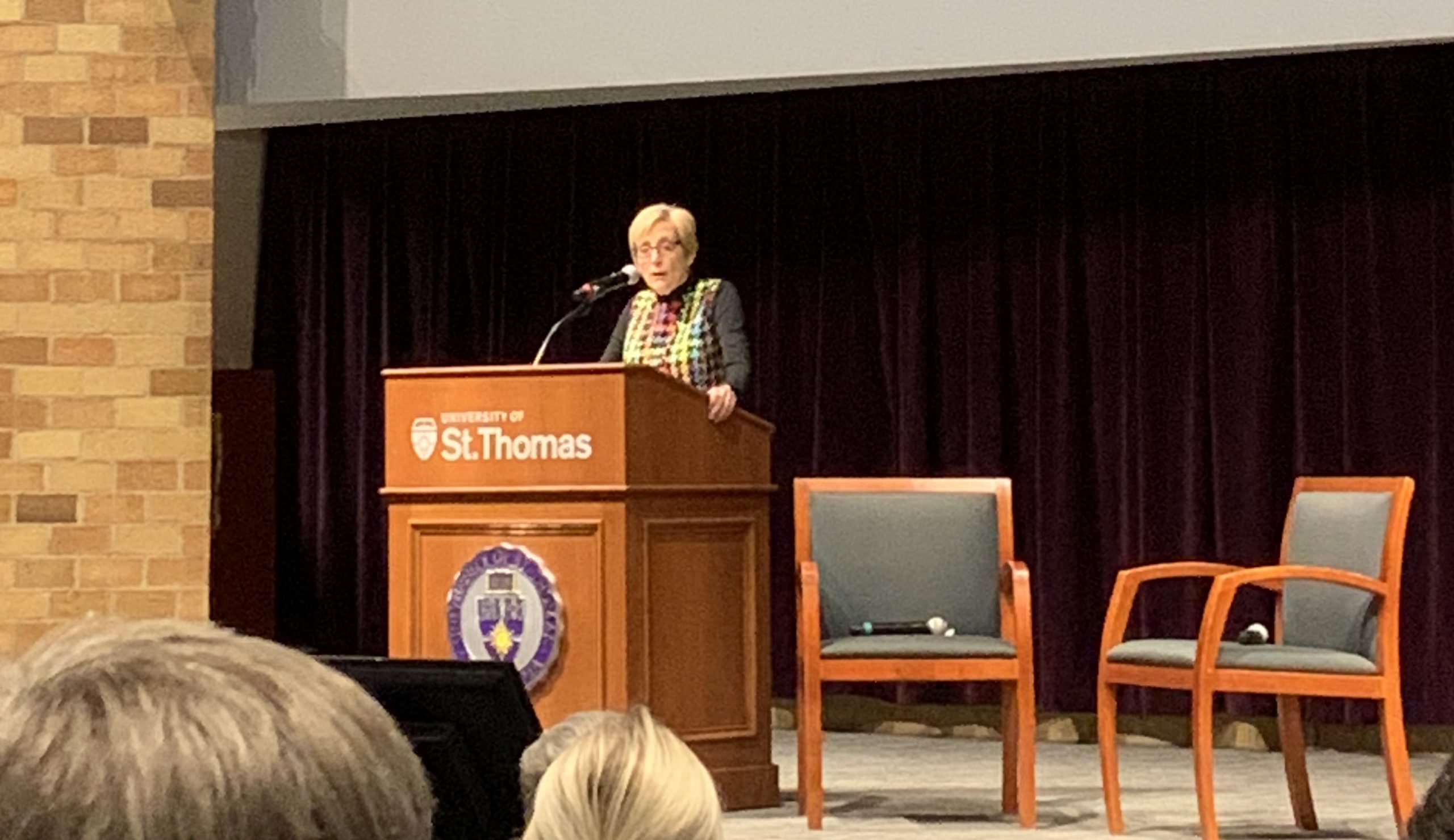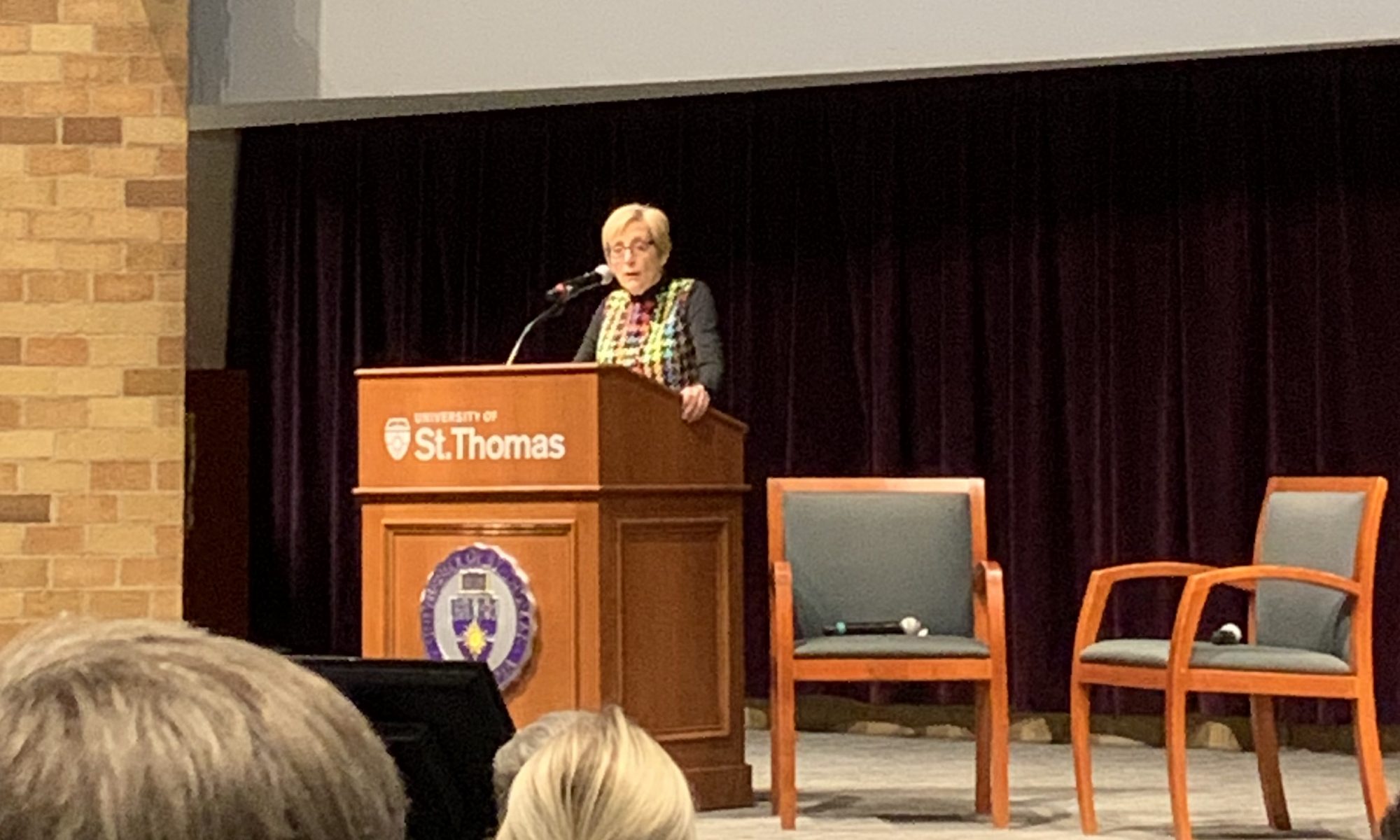
University of St. Thomas President Julie Sullivan addresses community members. Sullivan gave her second annual “State of the University” address in the O’Shaughnessy Educational Center Auditorium. (Mae Macfarlane/TommieMedia)
St. Thomas President Julie Sullivan looked to the university’s future in her second “State of the University” address Thursday afternoon.
Sullivan announced a $20 million scholarship donation and revealed the university will implement a test-optional policy for incoming students.
In the O’Shaughnessy Educational Center Auditorium, Sullivan said the university’s “forward-thinking” mindset has pushed new initiatives in health, curricula and athletics, while also bringing about change on campus.
“As a Catholic institution committed to justice and solidarity, we are also committed to a journey of learning and acknowledging more about our past,” Sullivan said.
Strategic Planning
Reflecting on the past year, Sullivan noted the university’s strides in accomplishing 2020 strategic plan goals to expand the university’s mission “All for the Common Good,” increase access to higher education, refine the core curriculum, form two health entities and improve the student experience.
In working to “break down barriers,” the university succeeded in launching the Dougherty Family College and graduating its first class, many of which are continuing their education at St. Thomas. DFC is a two-year college program for students who face social and financial barriers, yet have strong aspirations for college, Sullivan said.
Health care-related 2020 strategic goals included the Center for Well-Being, which offers support for mental health, nutrition and sleep. St. Thomas also formed the Morrison College of Health, which will help develop providers and leaders to address the integrated health care needs of families and communities.
“It will disrupt the status quo in health care systems and tackle those disparities,” Sullivan said.
At the end of this calendar year, St. Thomas transitions to new goals in the 2025 strategic plan currently being formed by the Strategic Plan Task Force. St. Thomas community members have been invited to join the process.
Kanthak Scholars
A $20 million donation from the estate of Irvin Kanthak, a 1959 St. Thomas graduate, will fund the Kanthak Scholars program, which coincides with the start of a two-year residency requirement for students.
“The residence requirement will only be effective if the option of living on campus is in financial reach,” Sullivan said.
The Kanthak Scholars program will be offered to 30 students, who will receive $10,000 each year the first two years on campus and $5,000 each for the last two years.
$50,000 per year will also be set aside for the assistance of students “who face unexpected life experiences.”
Sullivan also announced the gift would fund an alumni referral scholarship to attract out-of-state students with financial need. This scholarship is the first of its kind at St. Thomas and is a part of an effort to “involve alumni in helping recruit those students by offering them scholarships.
“Test Optional”
To continue the university’s goal of increasing access to education, St. Thomas will become a “Test Optional” university starting fall 2021. This will be a “more holistic analyzation” of applicants, and it will rely more on all factors of students’ qualities.
“Does this mean we are lowering our academic standards? Of course not,” said Sullivan. “We recognize that a standardized test is not the best predictor of college success.”
This approach will focus more on the applicants’ full array of skills and co-curricular activities.
This coming fall, the university will expand its student financial aid awards beyond merit-based scholarships to award-based on financial need.
By making these changes, Sullivan said St. Thomas will be more accessible to more students around the country.
Division I Hopes
After being involuntarily removed from the MIAC in May 2019, the university received an invitation to join the Division I Summit League in October 2019.
This move to the Summit League will require an NCAA waiver from its current rules, which state Division III schools can only reclassify to Division II.
While no decision has been made by the NCAA, Sullivan hopes that joining the Summit League, Pioneer League for football, and separate leagues for men’s and women’s hockey will expand St. Thomas’ reach and reputation.
Other private Catholic universities ranked above St. Thomas, Sullivan said, compete in Division I athletics.
“They all use athletics as a platform to tell their stories,” Sullivan said. “This move will increase our reputation overall in academia and, overall, extend our mission across the national stage.”
While the transition to Division I will cost the university more, Sullivan said the investment is worth it.
Emily Haugen, Samantha HoangLong, Mae Macfarlane and Abby Sliva contributed to this report.

